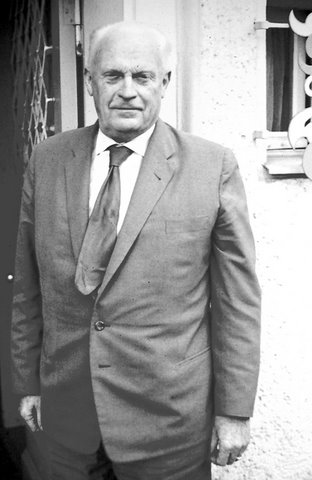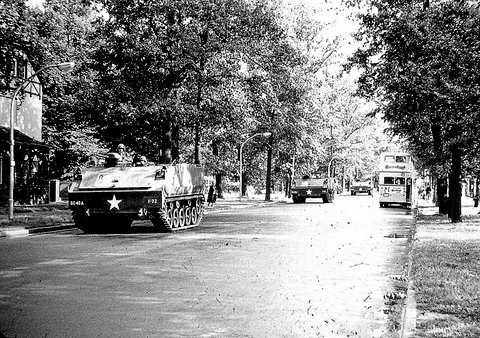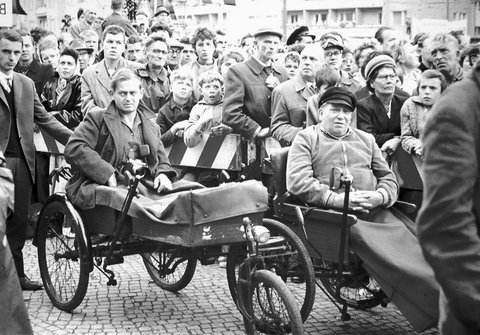by Richard L Rubenstein (August 2011)

August 13, 2011 marks the fiftieth anniversary of the erection of the Berlin Wall. I was quite unexpectedly in Berlin during that week fifty years ago. I began the day in Amsterdam making preparations to travel to Bonn, at the time West Germany’s capital, to meet with West German religious and cultural leaders as the guest of the Bundespresseamt, the Press and Information Office of the West German Federal Republic. As I packed, I turned on the radio to the American Armed Forces Radio Network and learned that the DDR, the so-called German Democratic Republic, had closed the border between East and West Berlin and ordered the erection of an electrified fence – later an actual wall – that turned West Berlin into an isolated enclave surrounded by a hostile, communist-controlled state. Because of the international crisis, I decided to postpone my trip.
By Tuesday August 15, it was apparent that there was no reason to delay the trip. I took a train from Amsterdam to Bonn, arriving at about 6:00 PM. I was met by a Frau Wiese, a representative of the Press and Information Office. She greeted me by asking: “Would you like to go to Berlin?” My itinerary had been planned around visits to Rhineland cities, not more distant Berlin, but Berlin was clearly the place to be.
As soon as I said “Yes,” she handed me a Pan American Airways round-trip ticket, already in my name, for a flight from nearby Cologne to Tegel Airport, Berlin, departing at 9:00 PM. The Bundespresseamt clearly wanted me to be in Berlin not the Rhineland.
The plane was a Douglas DC-7C with a passenger capacity of about 100. Only seven passengers were on board. Few people wanted to go to Berlin; a great many wanted to get out. My return flight was fully booked and I had difficulty getting a reservation.
There was an apocalyptic atmosphere of extreme crisis in Berlin. Sixteen years after the end of the war in Europe, many Berliners were fearful that the Third World War was about to start. People were afraid that nuclear war might suddenly break out, bringing the world to an end.
I was booked into the Hotel Am Zoo, a modest hotel on the Kurfürstendamm. My hosts cautioned me to let the desk clerk know if I decided to visit East Berlin. With passport identification, foreigners, but not West Berliners, could visit East Berlin. I was also advised not to enter East Berlin with a camera. Several foreigners with cameras had been arrested as spies. When I told the desk clerk I was going to East Berlin, he placed a small red flag on my mail box, noting my time of departure and expected time of return.
The streets of East Berlin were fairly empty, save for two Volkspolizei, in their green uniforms, at practically every street corner as far as I could see. They were armed with automatic rifles and accompanied by large, intimidating dogs. I was told that the Vopos were from Saxony, not Berlin. It was said that the regime did not know whether Berliners could be trusted to control their own fellow citizens in the crisis. As I walked through the streets of East Berlin, I was not disturbed but I was careful not to call attention to myself. I was understandably relieved when I returned to my hotel and told the desk clerk to take down the red flag from my mail box.
 Apart from interviewing a number of German leaders about German-American relations, Israel, and the state of West German politics, my most memorable interview was with Probst (Dean) Heinrich Grüber, an interview the Bundespresseamt was especially interested in arranging. Dean Grüber had been the only German to testify against Adolf Eichmann at his trial in Jerusalem in April 1961. During the war Eichmann, an SS-Obersturmbannführer (Lieutenant Colonel), had been the SS officer responsible for organizing the mass deportation of Jews to the extermination camps.
Apart from interviewing a number of German leaders about German-American relations, Israel, and the state of West German politics, my most memorable interview was with Probst (Dean) Heinrich Grüber, an interview the Bundespresseamt was especially interested in arranging. Dean Grüber had been the only German to testify against Adolf Eichmann at his trial in Jerusalem in April 1961. During the war Eichmann, an SS-Obersturmbannführer (Lieutenant Colonel), had been the SS officer responsible for organizing the mass deportation of Jews to the extermination camps.
It took a great deal of courage for Grüber to testify against a fellow German in an Israeli court. I was later to learn that Grüber had been a man of exemplary courage during the Hitler years. When the pro-Nazi German Christian movement gained control of the German Evangelical Church in 1933, Grüber joined the Confessing Church (Bekennende Kirche ) whose members included such opponents of the regime as Dietrich Bonhoeffer and Martin Niemöller. The Confessing Church came into being in response to actions by the far larger, pro-Nazi Evangelical Church such as adopting the “Aryan clause” which effectively defrocked pastors of Jewish descent as well as non-Jewish pastors with a “non-Aryan” spouse. The fundamental issue was whether race or baptism determined membership and service within the church.
Initially, men like Bonhoeffer and Grüber were not concerned with the Hitler regime’s anti-Semitic policies but with the church’s autonomy in matters religious. The attitude of most members of the Confessing Church toward Nazi antisemitism has been described by Wolfgang Gerlach, a German scholar and pastor, as “ambivalent.”[i] Grüber was one of a very small number of German Protestant clergy who, at great personal risk, sought to rescue Jews. His efforts began with baptized Jews in September 1938 when the Berlin Confessing Church set up the Büro Grüber (office). Initially, the office helped only baptized Jews to emigrate. This policy was consistent with the Confessing Church’s position in its dispute with the Nazis regime concerning whether baptism or race determined church membership. The church’s position was, of course, consistent with St. Paul’s teaching that “There is neither Jew nor Greek, slave nor free, male nor female, for you are all one in Christ Jesus.” (Galatians 3:8)
Grüber later expanded his work to include aid to non-converted Jews. As he became aware of the fate Nazi Germany had in store for all Jews without exception, he became willing to help any Jew who approached him. Moreover, as legal emigration became increasingly difficult, his office turned to “illegal” activities, such as providing false ration cards, passports, and identity cards. Eventually, the Büro Grüber tried to find hiding places for Jews who could not get out in time. In December 1940, the Gestapo arrested Grüber and incarcerated him first in Sachsenhausen and then in Dachau concentration camp. Of the 35 workers in that office, only 12 survived the war. Grüber was one of them.
Until the border closing the night of August 12/13, Grüber had been Dean of the Evangelical Church in both East and West Berlin. When I met him, he was understandably very upset. He lived in Dahlem, an affluent suburban section of West Berlin. He could no longer serve his flock. His church was in East Berlin which he could no longer enter. Moreover, Communist authorities had cut off direct phone communication between the two sectors of what had been a single city. Telephone calls from West to East Berlin were being routed through Copenhagen and it took about five hours for such calls to get through.
 I have often written about my conversation with Grüber that afternoon fifty years ago.[ii] As I entered his home, American tanks were rumbling down the street, one after another, in a welcome show of strength. Our conversation dealt largely with the Holocaust, especially the subject of God and the Holocaust concerning which we strongly disagreed. That was to be expected. Both of us were theologically trained. He told me that it was ultimately God who sent Adolf Hitler to punish the Jews at Auschwitz, a view I unconditionally rejected. Nevertheless, I recognized that his views were not motivated by anti-Jewish hostility. Grüber almost died as a result of his efforts to save Jews. The Nazis kicked out his teeth and at one point he was left for dead in Dachau. His views were actually grounded in his literal understanding of Scripture. Nor did he give Germans a free pass. He asserted that their defeat and its consequences, including the Berlin Wall, were also ultimately divinely inflicted.
I have often written about my conversation with Grüber that afternoon fifty years ago.[ii] As I entered his home, American tanks were rumbling down the street, one after another, in a welcome show of strength. Our conversation dealt largely with the Holocaust, especially the subject of God and the Holocaust concerning which we strongly disagreed. That was to be expected. Both of us were theologically trained. He told me that it was ultimately God who sent Adolf Hitler to punish the Jews at Auschwitz, a view I unconditionally rejected. Nevertheless, I recognized that his views were not motivated by anti-Jewish hostility. Grüber almost died as a result of his efforts to save Jews. The Nazis kicked out his teeth and at one point he was left for dead in Dachau. His views were actually grounded in his literal understanding of Scripture. Nor did he give Germans a free pass. He asserted that their defeat and its consequences, including the Berlin Wall, were also ultimately divinely inflicted.
I responded by saying that I would rather be an atheist than believe in such a God. I was not then an atheist nor am I an atheist now. Nevertheless, through the years I have been grateful to him for our conversation. A half century later I can honestly say that it was the most important theological conversation of my entire career and it became the basis of much of my theological writings, especially my book After Auschwitz with its chapter on “God After the Death of God.”[iii]
Most theological writing is based upon careful study and reflection on the written texts of previous thinkers and is triggered by intellectual speculation. I had studied under some of the twentieth century’s greatest religious thinkers, including Abraham Joshua Heschel and Paul Johannes Tillich. However, I arrived at my fundamental theological position by my unforgettable encounter with Probst Grüber on August 17, 1961 in the apocalyptic atmosphere of besieged West Berlin and the show of force by American army units outside of his home. Incidentally, I never had any sympathy for the hostile attitudes toward the military I found on most campuses in the nineteen-sixties and seventies. Without the presence of the American army in Berlin at that time the Soviet military and its allies might have been tempted to push on to the Rhine.

Earlier in the day I met Dean Grüber, I had attended a mass rally in the Rathaus Platz, the city-hall square. A crowd estimated to be perhaps two hundred thousand had come to hear Willy Brandt, then Mayor of West Berlin and later Chancellor of West Germany. I have kept photos I took on that occasion showing the uniformly anxious faces of the audience as they listened to Mayor Brandt. Two German amputee veterans seated in primitive conveyances are in the foreground in one of the pictures. Naked fear was in all their faces.
I had occasion to visit East Germany several times after the Wall crisis and before German reunification. In spring of 1983 and again in 1984, I was invited to give a series of lectures at the Theological Faculty of an East German university. I had come to know the dean of that faculty at several international conferences and he asked me if I would be willing to lecture at his university. Curious, I said that I would.
Thousands of East Germans were unable to travel outside of their country or communist-zone countries, yet the dean was free to travel in both Western Europe and the United States. His wife was, of course, always compelled to remain behind. When I came to his university, I was surprised to learn that he drove a very large, late-model Citroën whereas, the only car available to most East Germans was the two-cycle Trabi or Trabant. I should not have been surprised. East German universities were strictly controlled by the regime which insisted upon the political reliability of the senior administrator and, arguably, ordinary professors. It is highly unlikely that he would have been appointed dean if the regime did not trust him.
After Germany’s reunification in 1990, I not entirely surprised to learn that the dean had been an informant of STASI, the East German secret police and had been dismissed from his position. In my dealings wih him, I had found him agreeable, straightforward, and, while left-leaning, by no means a rigid ideologue. I wondered whether he had been a willing accomplice or whether he had been entrapped by STASI in stages. STASI certainly had the skills to turn a person. One of the reasons why I couldn’t rule out entrapment was because of what a Romanian professor of Englishwoman – an attractive woman in her late thirties – had told me and my wife at another international conference shortly after the fall of communism in her country. Because of her fluency in English, the Securitate, communist Romania’s secret police, insisted that she serve as a guide and translator for visiting foreign dignitaries. After having obliged the Securitate for some time, they called her in and accused her of being a spy. She was also accused of having sexual liaisons with some of the foreigners. Securitate’s apparent objective was to tighten their control over her. Fortunately, the regime fell before they could get very far with her. I could imagine STASI using a similar technique with the dean. Unlike Dean Grüber, he wasn’t prepared to risk his life or even his job in opposition to the regime. Nevertheless, whether or not he had been entrapped, he had caused real human suffering. The careers and the personal lives of colleagues he had betrayed were seriously damaged if not destroyed.
As I reflect on my experiences in Berlin fifty years ago, I think of President Obama’s recklessly irresponsible attempts to pressure Israel into dividing Jerusalem and agreeing to a “two-state solution.” The division of Berlin was a failure. People on both sides of the Wall shared a common language, nationality, and religious inheritance. When the Wall came down, Berliners from both sides had a common interest in restoring the city’s civic well-being. By contrast, a significant part of Jerusalem’s Arab community is religiously committed to the expulsion, if not the destruction, of Jerusalem’s Jewish community. The reconciliation agreement of May 2011 between Fatah and Hamas guarantees that a divided Jerusalem would be plagued by violence and terrorism aimed at making Jewish Jerusalem uninhabitable. The 1967 reunion of Jerusalem’s two sectors guaranteed the religious and civic rights of the Arab population, insofar as such rights are consistent with public safety. In spite of considerable Jewish opposition, the government of Israel even decided to ban all non-Muslim worship on the Temple Mount. Had the Israelis behaved as have conquering Muslims throughout history, they would have claimed the site for exclusive Jewish worship, if not the restoration of the Temple itself.
We do not have to conjecture concerning what a critical mass of Arabs would do in a divided Jerusalem. They would not rest content with a divided city or with a “two-state solution.” They have repeatedly declared that they intend to “unite” the city and the land by driving out those Israelis they do not kill. The tearing down of the Berlin Wall and the reunification of Germany was a precursor of peace and prosperity, as well as the emergence of Germany as the richest and the most productive nation in Europe. The division of Jerusalem and the establishment of an Arab and a Jewish state “living side by side” will not lead to peace but to terrorism and war.
This writer does not believe that the President of the United States is unaware of the likely consequences of dividing Jerusalem and the so-called “two-state solution.” He is neither stupid nor uninformed. It is far more likely that his is a darker intention.
Photos by Richard L. Rubenstein, Berlin, August 1961.
[i] The subject is dealt with extensively in Wolfgang Gerlach, And the Witnesses Were Silent: The Confessing Church and the Persecution of the Jews (Lincoln, NE: University of Nevada Press, 2000).
[ii] See the chapter, “The Dean and the Chosen People” in Richard L. Rubenstein, After Auschwitz: History, Theology and Contemporary Judaism, 2nd ed. (Baltimore: Johns Hopkins University Press, 1992, pp. 3-13.
[iii] After Auschwitz, 2nd ed., pp. 293-307.
To comment on this essay, please click here.
To help New English Review continue to publish original and thought provoking essays like this one, please click here.
If you have enjoyed this article and want to read more by Richard L. Rubenstein, please click here.
- Like
- Digg
- Del
- Tumblr
- VKontakte
- Buffer
- Love This
- Odnoklassniki
- Meneame
- Blogger
- Amazon
- Yahoo Mail
- Gmail
- AOL
- Newsvine
- HackerNews
- Evernote
- MySpace
- Mail.ru
- Viadeo
- Line
- Comments
- Yummly
- SMS
- Viber
- Telegram
- Subscribe
- Skype
- Facebook Messenger
- Kakao
- LiveJournal
- Yammer
- Edgar
- Fintel
- Mix
- Instapaper
- Copy Link









